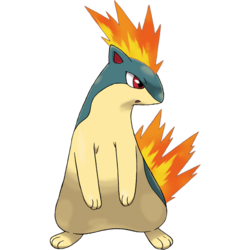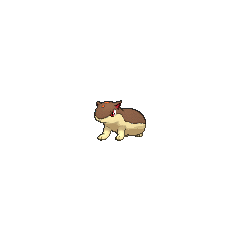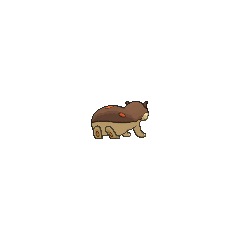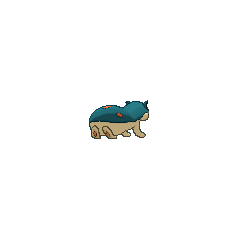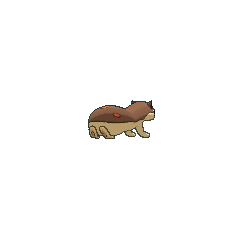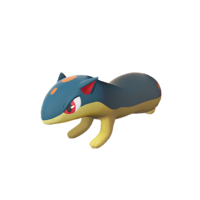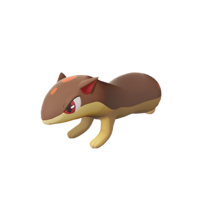Quilava (Japanese: マグマラシ Magmarashi) is a Fire-type Pokémon introduced in Generation II.
It evolves from Cyndaquil starting at level 14 and evolves into Typhlosion starting at level 36.
In Hisui, it evolves from Cyndaquil starting at level 17 and evolves into Hisuian Typhlosion starting at level 36.
Biology

Quilava without its flames lit
Quilava is a quadrupedal Pokémon with a long and slender body. The top half of its body is a dark blue-green, while its underside is cream-colored. It has triangular ears with dark red interiors, a rounded snout, and triangular red eyes. Each of its paws has three toes. It has five red spots on its body that can project flames: two arranged vertically on its forehead and three lined up horizontally on its rear.
Before a battle, Quilava turns its back so its flames face its opponent. It battles using these intense flames in combination with gusts of superheated air. Its own fur is non-flammable, which protects it from other fire attacks. Quilava tends to be rare in the wild, but can sometimes be found living on grasslands. When exposed to the mysterious energy of Mount Coronet in Hisui, Quilava's evolution is altered, gaining it the Ghost type as it becomes Hisuian Typhlosion.
In the anime
Major appearances
In An Old Family Blend!, Ash's Cyndaquil evolved into a Quilava after it fought one of Team Rocket's mechas. He later used it during his battle with Nando at the Lily of the Valley Conference, where it went up against Nando's Armaldo; the battle resulted in a tie.
Jimmy's Cyndaquil evolved into Quilava and further into Typhlosion sometime before the events of The Legend of Thunder!.
In DPS01, Dawn's Cyndaquil evolved into a Quilava in order to fight off a swarm of Ariados. It later reunited with Ash in Piplup, Pansage, and a Meeting of the Times!.
Other
In You're A Star, Larvitar, Ash witnessed a Trainer training with a Quilava for the Silver Conference. He also briefly considered getting his Cyndaquil to evolve as a way of training it for the Silver Conference, following Cyndaquil's defeat against Satchel's Magby.
In Love, Pokémon Style!, Macy used a Quilava against Ash during the Silver Conference, but it was defeated by Squirtle's Hydro Pump. Later, in Tie One On!, it battled Jackson's Poliwhirl and won.
In Shocks and Bonds, Clark used a Quilava and Charizard against Ash's Grovyle and Glalie. Despite the type disadvantage, Ash's Grovyle defeated Clark's Quilava.
In The Champ Twins!, Ryan used a Quilava in a battle against Ash and Dawn alongside his twin brother Byan and his Croconaw. The twins were initially able to defeat Ash's Turtwig and Dawn's Piplup due to the latter two having a lack of teamwork, but they were defeated in the rematch.
Alternate World Dawn's Quilava appeared in a flashback in The Gates of Warp!, devolving into Cyndaquil due to Dialga's influence.
Minor appearances
In Deceit and Assist, a Coordinator's Quilava competed in the Hoenn Grand Festival.
A Quilava appeared in Weekend Warrior.
In Not on MY Watch Ya Don't!, a Quilava was hypnotized and kidnapped by Team Rocket.
In A Crowning Moment of Truth!, two Trainers' Quilava attended the Wela Fire Festival.
In The Power of Us, a Trainer's Quilava went to the Pokémon Catch Race.
Pokédex entries
| Episode
|
Pokémon
|
Source
|
Entry
|
| EP262
|
Quilava
|
Ash's Pokédex
|
Quilava, the Volcano Pokémon. Quilava is the evolved form of Cyndaquil and capable of incredible attacks using the flame on its back.
|
|
| Episode
|
Pokémon
|
Source
|
Entry
|
| DP029
|
Quilava
|
Ash's Pokédex
|
Quilava, the Volcano Pokémon, and the evolved form of Cyndaquil. Its body is covered with fire-proof fur and can withstand any Fire-type attack.
|
| DP182
|
Quilava
|
Ash's Pokédex
|
Quilava, the Volcano Pokémon, and the evolved form of Cyndaquil. Quilava intimidates foes with its flame's heat, and when ready to battle, the fire burns with more strength.
|
| DPS01
|
Quilava
|
Dawn's Pokédex
|
Quilava, the Volcano Pokémon. It threatens opponents with the heat of its flames. When it assumes its battle pose, the force of its flames intensifies.
|
|
In the manga
Pokémon Adventures
- Main article: Exbo
In Quilava Quandary, Gold's Cyndaquil evolved into Quilava during a training session at the Day Care Center outside of Goldenrod City. He became more powerful than he was in his pre-evolved form, and defeated many of the Johto Team Rocket Grunts' Pokémon for Gold.
Pokémon Gold & Silver: The Golden Boys
In Let's Use Fighting Type Pokémon!!, Black borrowed a Quilava for a tournament.
Pokémon Ranger the Comic: Double Mission
In Pokémon Ranger the Comic: Double Mission Episode Two, Lunick captured a Quilava with his Capture Styler. It reappeared in Pokémon Ranger the Comic: Double Mission Episode Three and was released in Pokémon Ranger the Comic: Double Mission Episode Five.
In the TCG
- Main article: Quilava (TCG)
Game data
Pokédex entries
| This Pokémon was unavailable prior to Generation II.
|
| Generation II
|
|
|
Johto
#005
|
| Gold
|
Be careful if it turns its back during battle. It means that it will attack with the fire on its back.
|
| Silver
|
This Pokémon is fully covered by nonflammable fur. It can withstand any kind of fire attack.
|
| Crystal
|
Before battle, it turns its back on its opponent to demonstrate how ferociously its fire blazes.
|
| Stadium 2
|
Be careful if it turns its back during battle. It means that it will attack with the fire on its back.
|
|
|
| Generation III
|
|
Hoenn
#—
|
|
Kanto
#—
|
| Ruby
|
Quilava keeps its foes at bay with the intensity of its flames and gusts of superheated air. This Pokémon applies its outstanding nimbleness to dodge attacks even while scorching the foes with flames.
|
| Sapphire
|
| Emerald
|
It intimidates foes with intense gusts of flames and superheated air. Its quick nimbleness lets it dodge attacks even while scorching an enemy.
|
| FireRed
|
This Pokémon is fully covered by nonflammable fur. It can withstand any kind of fire attack.
|
| LeafGreen
|
Be careful if it turns its back during battle. It means that it will attack with the fire on its back.
|
|
|
| Generation IV
|
|
Sinnoh
#—
|
|
Johto
#005
|
| Diamond
|
It intimidates foes with the heat of its flames. The fire burns more strongly when it readies to fight.
|
| Pearl
|
| Platinum
|
| HeartGold
|
Be careful if it turns its back during battle. It means that it will attack with the fire on its back.
|
| SoulSilver
|
This Pokémon is fully covered by nonflammable fur. It can withstand any kind of fire attack.
|
|
|
| Generation V
|
|
|
Unova
#—
|
| Black
|
It intimidates foes with the heat of its flames. The fire burns more strongly when it readies to fight.
|
| White
|
| Black 2
|
It intimidates foes with the heat of its flames. The fire burns more strongly when it readies to fight.
|
| White 2
|
|
|
| Generation VI
|
|
Kalos
#—
|
|
Hoenn
#—
|
| X
|
Before battle, it turns its back on its opponent to demonstrate how ferociously its fire blazes.
|
| Y
|
Be careful if it turns its back during battle. It means that it will attack with the fire on its back.
|
| Omega Ruby
|
Quilava keeps its foes at bay with the intensity of its flames and gusts of superheated air. This Pokémon applies its outstanding nimbleness to dodge attacks even while scorching the foes with flames.
|
| Alpha Sapphire
|
|
|
|
|
| Generation VIII
|
|
Galar
#—
|
|
Sinnoh
#—
|
|
Hisui
#005
|
| This Pokémon has no Pokédex entries in Sword and Shield.
|
| Brilliant Diamond
|
It intimidates foes with the heat of its flames. The fire burns stronger as it prepares to fight.
|
| Shining Pearl
|
| Legends: Arceus
|
This creature's fur is most mysterious—it is wholly impervious to the burning touch of flame. Should Quilava turn its back to you, take heed! Such a posture indicates a forthcoming attack.
|
|
|
|
|
Game locations
In Pokémon Colosseum, only one Quilava can be obtained per game without trading, regardless of location.
| This Pokémon was unavailable prior to Generation II.
|
|
|
|
|
|
|
|
|
|
|
|
|
|
|
|
|
In side games
| This Pokémon was unavailable prior to Generation II.
|
| Generation II
|
|
| This Pokémon is unavailable in Generation II side games.
|
|
|
|
|
|
|
|
|
|
|
|
|
|
|
|
|
Held items
Stats
Base stats
| Stat
|
Range
|
| At Lv. 50
|
At Lv. 100
|
58
|
|
118 - 165
|
226 - 320
|
64
|
|
62 - 127
|
119 - 249
|
58
|
|
56 - 121
|
108 - 236
|
80
|
|
76 - 145
|
148 - 284
|
65
|
|
63 - 128
|
121 - 251
|
80
|
|
76 - 145
|
148 - 284
|
Total: 405
|
Other Pokémon with this total
|
- Minimum stats are calculated with 0 EVs, IVs of 0, and (if applicable) a hindering nature.
- Maximum stats are calculated with 252 EVs, IVs of 31, and (if applicable) a helpful nature.
|
Pokéathlon stats
Type effectiveness
| Under normal battle conditions in Generation IX, this Pokémon is:
|
|
|
|
|
|
|
|
|
|
|
|
|
Learnset
|
|
|
|
- Bold indicates a move that gets STAB when used by Quilava
- Italic indicates a move that gets STAB only when used by an Evolution of Quilava
- Click on the generation numbers at the top to see level-up moves from other generations
|
|
|
|
|
- Bold indicates a move that gets STAB when used by Quilava
- Italic indicates a move that gets STAB only when used by an Evolution or an alternate form of Quilava
- Click on the generation numbers at the top to see TM moves from other generations
|
|
|
|
|
- Moves marked with an asterisk (*) must be chain bred onto Quilava
- Bold indicates a move that gets STAB when used by Quilava
- Italic indicates a move that gets STAB only when used by an Evolution of Quilava
- Click on the generation numbers at the top to see Egg moves from other generations
|
|
|
|
|
- Bold indicates a move that gets STAB when used by Quilava
- Italic indicates a move that gets STAB only when used by an Evolution of Quilava
- Click on the generation numbers at the top to see moves from other generations
|
TCG-only moves
Side game data
|
|
|
|
|
|
Pokémon Ranger
| Group:
|
|
Poké Assist:
|

|
Field move:
|
 
(Burn ×2)
|
| Loops: 6
|
Min. exp.: 36
|
Max. exp.: 66
|
Browser entry R-020
|
| Quilava blows flames all around itself. It can easily burn up large Fallen Logs.
|
|
|
|
|
|
|
Pokémon Rumble Rush

|
Walking Speed: 1.32 seconds
|
Base HP: 50
|
|
| Base Attack: 74
|
Base Defense: 51
|
Base Speed: 60
|
|
|
|
|
|
|
|
|
|
Evolution
Sprites
| This Pokémon was unavailable prior to Generation II.
|
|
|
|
|
|
|
|
|
|
|
|
|
|
|
Trivia
- Quilava shares its category with its evolved form and Entei. They are all known as the Volcano Pokémon.
- Coincidentally, they all are capable of learning Eruption.
- Quilava, Charmeleon, and their respective evolutionary lines have exactly the same base stats in the same distribution.
- Jeff Kalles, who assisted in the naming of many Generation II Pokémon, suggested the English name for Quilava. According to Kalles, he suggested the name because Nintendo and The Pokémon Company wanted a Pokémon for every letter of the alphabet.[1][2]
Origin
Quilava's body is similar to that of some animals in the weasel family, particularly due to the fur on its upper body being significantly darker than that on its underbelly. However, the pattern distribution and shape of Quilava's flames closely resembles the quills and crest of the crested porcupine, especially in its earlier sprites. It may also be based on volcanoes due to its triangular profile when standing up and the ability to learn Smokescreen and Eruption.
Name origin
Quilava may be a combination of quill (a needle-like hair) and lava (extrusive molten rock).
Magmarashi may be a combination of magma and 山荒 yama-arashi (porcupine).
In other languages
| Language
|
Title
|
Meaning
|
 Japanese Japanese
|
マグマラシ Magmarashi
|
From magma and 山荒 yama-arashi
|
 French French
|
Feurisson
|
From feu and hérisson
|
 Spanish Spanish
|
Quilava
|
Same as English name
|
 German German
|
Igelavar
|
From Igel and Lava
|
 Italian Italian
|
Quilava
|
Same as English name
|
 Korean Korean
|
마그케인 Mageukein
|
From magma and hurricane
|
 Mandarin Chinese Mandarin Chinese
|
火岩鼠 Huŏyánshŭ
|
From 火 huŏ, 熔岩 róngyán, and 鼠 shŭ
|
 Cantonese Chinese Cantonese Chinese
|
火岩鼠 Fóngàahmsyú
|
From 火 fó, 熔岩 yùhngngàahm, and 鼠 syú
|
|
|
|
| More languages
|
 Hindi Hindi
|
कुईलावा Quilava
|
Transcription of English name
|
 Russian Russian
|
Квилава Kvilava
|
Transcription of English name
|
 Thai Thai
|
แม็กมาราชิ Maekmarachi
|
Transcription of Japanese name
|
|
|
|
Related articles
References
External links

|
This Pokémon article is part of Project Pokédex, a Bulbapedia project that aims to write comprehensive articles on each Pokémon species, as well as Pokémon groups and forms.
|


 For other sprites and images, please see Quilava images on the Bulbagarden Archives.
For other sprites and images, please see Quilava images on the Bulbagarden Archives.
